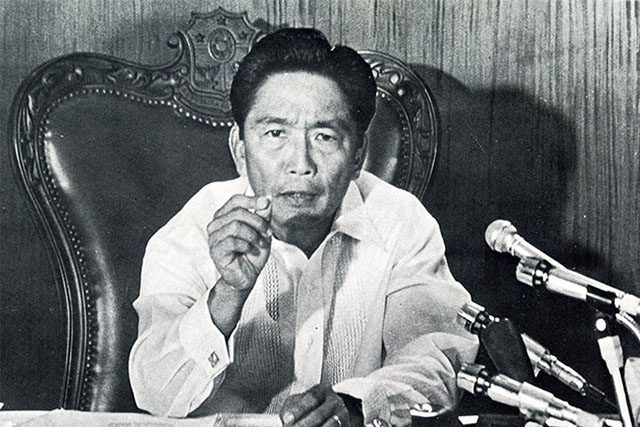
(UPDATED Sept. 4, 2020 7:12 p.m.) The passage of a House bill that declares ousted dictator Ferdinand Marcos‘ birthdate as a special non-working holiday in Ilocos Norte was seen as a fresh attempt of historical revisionism done to invalidate Martial Law victims.
The House of Representatives on Wednesday voted in favor of House Bill 7137 which seeks to honor the dictator’s day of birth on September 11 under the “President Ferdinand Edralin Marcos Day.”
The bill earned 197 affirmative votes, nine negative votes and one abstention in the lower chamber.
It was primarily authored by three Ilocano lawmakers, namely Rep. Angelo Marcos Barba (Ilocos Norte, Second District) who is Marcos’ nephew, Rep. Rina Fariñas (Ilocos Norte, First District) and Rep. Rudys Caesar Fariñas (Probinsyano Ako party-list).
Barba reportedly said that the dictator laid the “foundation for nation-building” and added that the Philippines was “ahead of our time,” supposedly in terms of agriculture, education, infrastructure, energy production, and foreign policy.
The Fariñases additionally claimed that the dictator supposedly displayed extraordinary memory and brilliance and had topped the 1939 Philippine Bar examinations.
Marcos was born in Sarrat, Ilocos Norte on Sept. 11, 1917.
Meanwhile, September, the month under which the bill seeks to honor his birthdate, is also the same month when he declared Martial Law which resulted in countless human rights violations.
The bill does not have a counterpart in the Senate so far.
Attempt to revise history
The lower chamber’s proposal was condemned by Filipinos who accused it as another attempt at the “Marcos historical revisionism” intending to invalidate the oppression and corruption that ruled in his 21-year presidency.
“Honoring him is like spitting on the graves of all the Martial Law victims and the faces of their families,” a Twitter user commented in response to the reports.
“Marcos’ regime was a long dark night in our history, marked by massive human rights abuses, terror, plunder, and repression. Tigil tigilan niyo nga kami sa mga tactics niyo for historical revisionism. We will never forget. Marcos diktador, hindi bayani!” another online user wrote.
The Republic Act 10368 or the Human Rights Victims Reparation and Recognition Act of 2013 recognizes “the sacrifice and heroism of all Filipinos who were victims of summary execution, torture, enforced or involuntary disappearances and other gross human rights violations” under the Marcos regime.
It also provides for the creation of a library and museum in honor of the Martial Law victims to be funded by the ill-gotten wealth retrieved by the Presidential Commission on Good Governance.
Meanwhile, human rights organization Karapatan described the House bill as a “nefarious scheme to cover up the crimes committed by the late dictator and a blatant act of historical revisionism by the Marcoses.”
“The bill seeks to deodorize the image of a murderer, a plunderer and a criminal. It is a grave disgrace to the memory of martial law victims and survivors, who have been violated many times over by the Marcos dictatorship,” the group added in a statement.
What actually happened
Marcos’ regime was considered the country’s darkest years post-colonial period due to the curtailment of civil liberties, extrajudicial killings and unsolved disappearances, media oppression and economic recession, among others.
RELATED: 31 YEARS OF AMNESIA: STORIES ON THE MYTHS THAT MADE MARCOS
London-based human rights organization Amnesty International said that “some 70,000 people were imprisoned and 34,000 were tortured; over 3,200 people were killed” from 1972 to 1981, during the years that Martial Law was imposed.
Marcos’ Martial Law lasted for almost a decade which resulted in an “era of impunity” where activists, human rights defenders and mere civilians were arrested with the suspension of the writ of habeas corpus by emboldened uniformed personnel.
The period also saw the country mired with debt, which happened in part due to “a pattern of chronic borrowing, devaluation of the peso which bloated prices of goods, and reckless spending” of the regime.
“Income distribution also worsened during Martial Law, with the poorest segment of society seeing a decline in their share of the total income between 1971 and 1979. The richest 10 percent, on the other hand, enjoyed a much larger piece of the pie,” Philstar’s NewsLab reported.
“About 42 percent of Filipinos were considered poor in the 1960s when Marcos rose to power. In 1971, the year before Marcos declared martial law, poverty incidence rose to 52 percent. By the time Marcos approached the end of his 21-year rule, already three of five Filipinos (59 percent) were poor,” it added.









